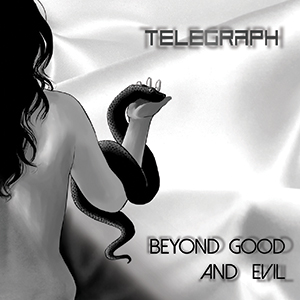 1.Beyond Good and Evil
1.Beyond Good and Evil
2.The Veil of Maya
3.I Wanted Love
4.Game Over
5.This World’s Too Loud
6.I Prefer Machines
7.Hikikomori
8.Something To Live For
9.Renaissance
10.The Losers
11.Game Over (Remix)
12.I Prefer Machines (Dynamic Master Remix)
13.The Losers(Klaak Remix)
Telegraph is an Italian electronic band characterized by marked synthpop influences and heavily inspired by
the New Wave movement.
The project originated in 2010 in Bari (southern Italy) brainchild of Davide Colella, and started with the first
line-up to work on the earliest compositions in 2011.
In April 2012, the band qualified for the regional final of the ‘Gothic Room’ festival, performing then as
opening act for industrial band Surgery, and in November of the same year, for electropop band Ottodix.
The year 2013 starts with Francesco Romeo Sacco joining the line-up and, in the autumn of that year, the
band self-produced a demo EP titled ‘Open Wounds’, which includes the early songs of the band.
Since 2014, Davide and Romeo decided to renew the project and ‘Telegraph’ becomes a duo that
immediately started working on the songs that will form the debut album.
The first single from the new course is ‘The Veil of Maya’, published on September 11, 2014, as a digital
release.
In 2015 the band returns on stage with two opening acts: May 29 with ‘Peine Perdue’ and November 21
with ‘L.A.S.’s Crime’.
At the end of the same year it’s completed and announced the first full-length album ‘Beyond Good and
Evil’.
BEYOND GOOD AND EVIL – Album description.
From a musical point of view, ‘Beyond Good and Evil’ is everything but minimalistic, characterized by rich
electronic arrangements and multiple textures of melodies and orchestrations. The retro-futuristic style
recalls many ‘80s pop icons, such as Ultravox, Depeche Mode, Simple Minds or Gary Numan, without
lacking more modern rock and industrial influences.
It was not born as a concept album, and probably it’s not such even if we look at the end result. However,
at some point in the working phase, we noticed the existence of a ‘leitmotif’, born spontaneously and
almost unconsciously; an underlying thread behind the scaffolding of the entire album, but at the same
time, organic to the latter.
It’s the concept of hypocrisy, effectively symbolized by the ‘veil’ (a metaphor borrowed from the
philosophy of Schopenhauer and, before him, from the eastern culture); something that is between the
observer and the real essence of things.
This is the intrinsic concept of BGaE; a trace of it can be spotted in each song, always from a different point
of view. The veil can be a metaphor for many forms of hypocrisy: the perversion of social patterns, the lack
of transparency and sincerity in relations between lovers or friends, the want of communication and
isolation barrier behind which some of us take shelter to protect ourselves from cruelty and the irrational
chaos of this world, the sterile materialism of a substantial part of our society, etc..
This is evident from the first song ‘The Veil of Maya’, which can be considered the manifesto of the entire
work; in it, it’s also obsessively present the exhortation which is the other thread of the album; It’s not
limited to single out the existential problems but it also offers a possible solution: the gash of the veil, the
abandonment of any illusory condition of human life; a difficult but essential process, desirable – mind you -no matter what you encounter on the other side of the wall (it is here that takes way the quote from
Nietzsche that gives the title track, although completely changed to the original direction), whether is
‘Good’ or ‘Bad’.
We must accept the truth of our existence for what it is; if necessary, fight to change it. However, too often
humans mutilate themselves in a voluntary state of minority, afraid to face reality. Changes are possible,
anyhow, if each one realizes this simple thing.
‘Beyond Good and Evil’ is essentially this: a humanist work, which criticizes the human race for human
race’s sake. The great hope hidden behind the veil of pessimism.

